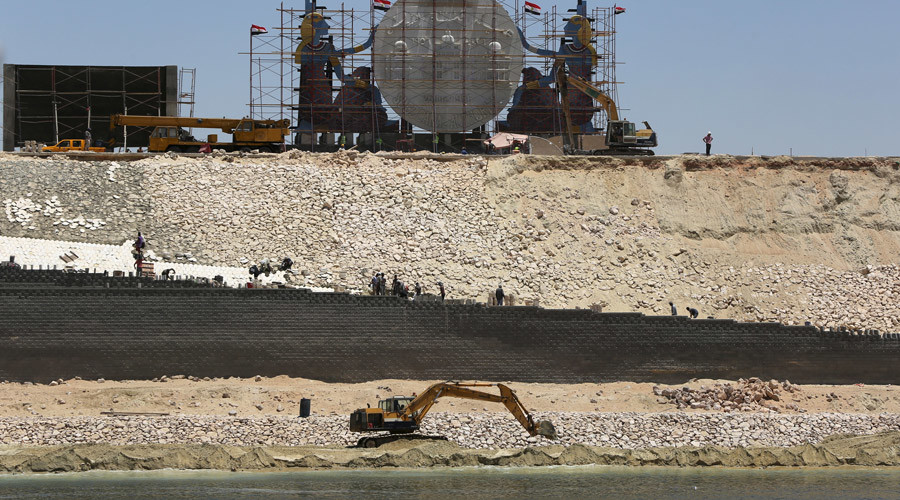The new route, which has been dubbed Suez Canal Axis, is now ready for navigation and will formally be opened on August 6, according to officials in the city of Ismailiya. It runs along the existing 146-year-old canal connecting the Mediterranean Sea with the Red Sea.
“We have finished work on time and even before the specified time…We call on all the international maritime carriers to use the current and the new Suez canal. Your navigation is safe,” retired Admiral Mohab Mameesh, chairman of the Suez Canal Authority, said at a news conference on Wednesday, adding that the new canal can be used by all types of vessels.
The $8-billion project was launched in August 2014 and supervised by the military after President Abdel Fatah el-Sisi ordered the construction to be completed within one year.
READ MORE: Egypt plans to open New Suez Canal on August 6
Other than reducing the waiting period for ships from about 20 to 11 hours – with Mameesh calling the improvement “Egypt’s gift to the world” – the newly-constructed two-way route promises to nearly triple revenue from the Suez Canal to over $13 billion per year by 2023.
Moreover, ambitious plans for a massive international industrial and logistics hub near the new canal will help boost the Egyptian economy, eventually accounting for up to one third of GDP.

As part of the project, the creation of a Russian industrial zone has been agreed upon by President el-Sisi and his Russian counterpart, Vladimir Putin.
READ MORE: Egypt to join Russia-led Eurasian free trade zone
The opening of the new canal is seen as a major breakthrough for the Egyptian government in its efforts to mitigate investor fears concerning the turbulent political situation in the country over the last four years, combined with economic difficulties and Islamist insurgent activity. Foreign investors became wary of risking their money in the country after the 2011 Egyptian Revolution that ousted President Hosni Mubarak and brought the Muslim Brotherhood to power. It was followed by a period of mass protests against President Mohamed Morsi, which resulted in a July 2013 military coup that suppressed the group.
Former Egyptian army chief, el-Sisi was elected as the country’s new president in May 2014 after a transitional period. He will personally inaugurate the new canal on August 6.
Egypt will celebrate the historic event with major festivities: the Cairo Opera House will perform Aida, and the renowned Egyptian Musician Omar Khairat will give a concert with over a thousand performers participating. According to the Suez Canal Authority, ships at ports all over the world will blow their horns simultaneously on the launch date to mark the new Suez Canal’s opening.
Article source: http://www.rt.com/business/311127-egypt-new-suez-canal-ready/?utm_source=rss&utm_medium=rss&utm_campaign=RSS